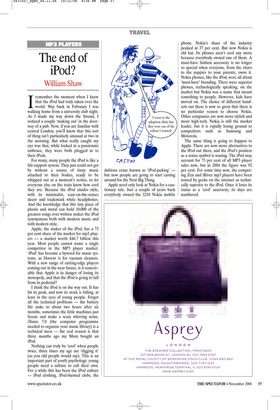The end of iPod?
William Shaw
Iremember the moment when I knew that the iPod had truly taken over the world. Way back in February I was walking home from a university club night. As I made my way down the Strand, I noticed a couple ‘making out’ in the doorway of a pub. Now, if you are familiar with central London, you’ll know that this sort of thing isn’t particularly unusual at two in the morning. But what really caught my eye was that, while locked in a passionate embrace, they were both plugged in to their iPods.
For many, many people the iPod is like a life-support system. They just could not get by without a source of tinny music attached to their bodies, ready to be whipped out at a moment’s notice, to let everyone else on the train know how cool they are. Because the iPod exudes style, with its minimalist, easy-on-the-senses decor and trademark white headphones. And the knowledge that this tiny piece of plastic and metal can hold 10,000 of the greatest songs ever written makes the iPod synonymous both with modern music and with modern style.
Apple, the maker of the iPod, has a 73 per cent share of the market for mp3 players — a market worth $46.7 billion this year. Most people cannot name a single competitor in the MP3 player market. ‘iPod’ has become a byword for music systems, as Hoover is for vacuum cleaners. With a new range of cutting-edge players coming out in the near future, is it conceivable that Apple is in danger of losing its monopoly, and that the iPod is going to fall from its pedestal?
I think the iPod is on the way out. It has hit its peak, and now its stock is falling, at least in the eyes of young people. Forget all the technical problems — the battery life sinks to about two hours after six months, sometimes the little machines just freeze and make a scary whirring noise, iTunes 7.0 (the computer programme needed to organise your music library) is a technical mess — the real reason is that three months ago my Mum bought an iPod.
Nothing can truly be ‘cool’ when people twice, three times my age are ‘digging it’ (as you old people would say). This is an important part of youth psychology: young people need a culture to call their own. For a while this has been the iPod culture — iPod clothing, iPod-themed clubs, the dubious craze known as ‘iPod-jacking’ but now people are going to start casting around for the Next Big Thing.
Apple need only look at Nokia for a cautionary tale. Just a couple of years back everybody owned the 3210 Nokia mobile phone. Nokia’s share of the industry peaked at 37 per cent. But now Nokia is old hat. Its phones aren’t cool any more because everybody owned one of them. A must-have fashion accessory is no longer so special when everyone, from the chavs to the yuppies to your parents, owns it. Nokia phones, like the iPod, were all about ‘must-have’ branding. There were superior phones, technologically speaking, on the market but Nokia was a name that meant something to people. However, kids have moved on. The choice of different handsets out there is now so great that there is no particular reason to choose Nokia. Other companies are now more stylish and more high-tech. Nokia is still the market leader, but it is rapidly losing ground to competitors such as Samsung and Motorola.
The same thing is going to happen to Apple. There are now more alternatives to the iPod out there, and the iPod’s position as a status symbol is waning. The iPod may account for 73 per cent of all MP3 player sales now, but in 2004 the figure was 92 per cent. For some time now, the competing Zen and iRiver mp3 players have been touted by geeks on the internet as technically superior to the iPod. Once it loses its status as a ‘cool’ accessory, its days are numbered.


















































































































 Previous page
Previous page